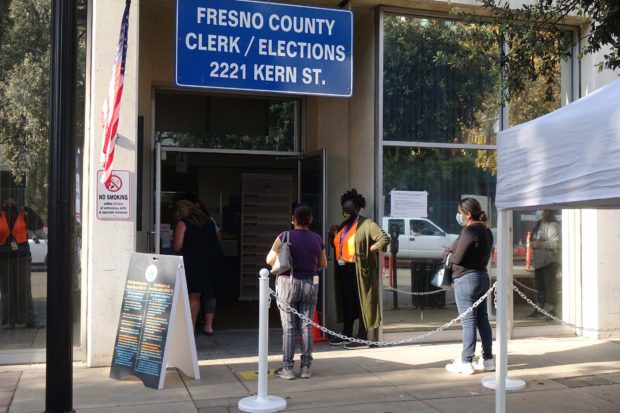
It’s the “civil rights issue of our time,” voting rights advocates say, but three different proposals to strengthen and create nationwide standards on voting are all stalled in Congress.
“Democracy is facing challenges unlike any we have seen in modern time,” said Wade Henderson, CEO of the Leadership Conference on Civil and Human Rights, at a press briefing hosted by Ethnic Media Services and Leadership Conference on Nov. 5.
Already this year, in 19 states, legislators have passed 33 laws that will make it harder to vote. In all, 425 new voting rules have been proposed in 49 states.
Generally, where it’s been challenging to vote, the new laws have made it harder, Henderson noted. In Florida and Georgia, for example, giving water or snacks to people waiting in lines to vote is now a crime.
This “torrent” of new rules on voting across the country is due to two recent Supreme Court decisions gutting the 1965 Voter Rights Act, combined with the “Big Lie” frenzy stoked by former President Trump, still trying to overturn the 2020 election.
“We still have tools available to us, but fewer than we once did,” said Sean Morales-Doyle of the Brennan Center’s Democracy Project.
And even in those two recent rulings that gutted the Voting Rights Act (VRA)—2013’s Shelby v. Holder and July 2021’s Brnovich v. DNC—the Supreme Court acknowledged Congress’ ultimate responsibility for setting federal voting standards, Morales-Doyle pointed out.
“We actually do have two pieces of legislation that would help us get us past this moment,” Morales-Doyle pointed out. “The Freedom to Vote Act and the John Lewis Voting Rights Advancement Act.”
On Nov. 3, Senator Lisa Murkowski (R–Alaska) was the 51st “yes” vote for discussing the proposed John Lewis Voting Rights Advancement Act.
Jacqueline DeLeon of the Native American Rights Fund noted that Murkowski was elected, in part, thanks to native Alaskan voters traveling long distances to get to polling places to vote in the pitch-black dark in the snow after learning how to spell her name to support her write-in election in 2012.
But filibuster rules in the Senate meant that 51 of 100 possible votes was not enough. Because of the filibuster, it takes 60 votes to do most things. There are currently 50 Republican senators, two Independents and 48 Democrats.
But 51 votes would be enough to change that filibuster rule, for example, by making an exception for voting laws, similar to the exception made for Supreme Court nominations in 2017.
“All eyes are on Congress and the Senate,” Morales-Doyle said.
Meanwhile, in Indian Country, change is long overdue.
DeLeon described how some reservations have no polling places at all, forcing impoverished voters to drive 100 miles on dirt roads into sometimes inhospitable, racist border towns to exercise their voting rights.
Lousy mail service, too, can make registration and absentee voting difficult to impossible, she said.
“Natives vote if they’re provided a fair opportunity, but they’re too often not given that fair chance.”
“We need to get away from the framing that voting rights is a Democratic ask,” she concluded. “This is about protecting American citizens from racist abuse and denying them their right to participate in the American political process.”
John C. Yang of Asian Americans Advancing Justice-AAJC also emphasized the nonpartisan importance of seeing that everyone’s voice is heard.
“Then we have an argument on the values, on the issues. We try to persuade the voters that our policies make sense. That’s the beauty of democracy.”
“Our community is quite diverse,” he said. Asian Americans have become the fastest-growing ethnic group in the country. “We have individuals of all different political stripes.”
“For us, it is about making sure that every citizen that has the right to vote has the opportunity to do so in a most efficient and effective manner.”
He described how voter ID laws sometimes run afoul of language barriers. And once a person has secured their right to vote, having multilingual voting materials and mail-in voting is also important.
“It is about having communities not feeling that they are less of a citizen because of their immigrant status or because they have limited English proficiency or because they have different socioeconomic means that don’t allow them to vote during a 9–5 period.”
Henderson pointed out how 13 of the same senators who stopped the Lewis Act last week, such as John Conryn (R–Texas), had all previously voted in favor of continuing the VRA.
“We have to take the fight to them,” he said. “This is a right and we should demand it and we should generate the political heat necessary to obtain it.”
The Leadership Conference has prepared 14 reports documenting the state of voting rights in 13 states across the country: Alabama (second Alabama report), Alaska, Arizona, California, Florida, Georgia, Louisiana, Mississippi, New York, North Carolina, South Carolina, Texas and Virginia.
“The way forward is through Congress, and Congress needs to be told that over and over and over again,” Morales-Doyle said.
In the meantime, he and other voting rights advocates are using what tools they still have to take the battle to the courts.
The Justice Department recently joined a suit by the Brennan Center, the Mexican American Defense and Educational Fund and others against new rules in Texas.
“None of the work stops while we’re waiting for Congress to act, but we still need Congress to act,” Morales-Doyle said.
“Apart from suing, we need to keep up the work to change the public narrative on this. And people do want an expansive democracy!”
*****
